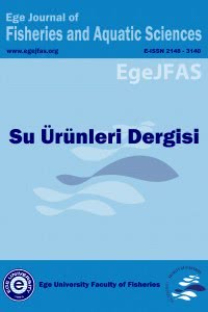A preliminary study on sustainability of fishery cooperatives in the North-eastern Mediterranean, Turkey
Kuzeydoğu Akdeniz (Türkiye) su ürünleri kooperatiflerinin sürdürebilirliği üzerine bir ön çalışma.
___
- Arısoy, S. 1974a. What should be the strategy of Turkish fishery cooperative’s movement? (in Turkish with English abstract) Fish and Fisheries, 22(3):19-22.
- Arısoy, S. 1974b. What should be the strategy of Turkish fishery cooperative’s movement? (in Turkish with English abstract) Fish and Fisheries, 22:23-25.
- Baticados, D.B., Agbayani, R.F., Gentoral, F.E. 1998. Fishing cooperatives in Capiz, central Philippines: their importance in managing fishery resources. Fisheries Research, 34:137-149.
- Baticados, D.B. 2004. Fishing cooperatives’ participation in managing nearshore resources: the case in Capiz, Central Philippines. Fisheries Research, 67:81–91.
- Berkes, F. 1986. Local-level management and the commons problem. A comparative study of Turkish coastal fisheries. Marine Policy, 10:215- 229.
- Berkes, F. 1992. Success and failure in marine coastal fisheries of Turkey. In: Making the Commons Work (D.W. Bromley, ed.) Institute for Contemporary Studies Press, San Francisco pp. 161-182.
- Çeliker, S.A., Dönmez, D., Gül, U., Demir, A., Genç, Y., Kalanlar, Ş., Özdemir İ. 2006. Socio-economic analysis of fishing enterprises in Black Sea region (in Turkish with English abstract). Agricultural Research Institute, Ankara, 134 p.
- Çeliker, S.A., Demir, A., Gül, U., Dönmez, D., Özdemir, İ., Kalanlar, Ş. 2008. Socio-economic analysis of fishing enterprises in Aegean region (in Turkish with English abstract). Agricultural Research Institute, Ankara, 121 p.
- Çıkın, A., Elbek, A.G. 1991. Fishery cooperatives in Turkey and EU (in Turkish with English abstract). Eğitiminin 10. yılında Su Ürünleri Sempozyumu. 12-14 Kasım, İzmir, 751 p.
- Jentoft, S. 2000. The community: a missing link of fisheries management, Marine Policy, 24(1):53-60.
- Jentoft, S. 2005. Fisheries co-management as empowerment. Marine Policy, 29:1-7.
- Koçel, T. 1971. Fisheries and cooperations, (in Turkish with English abstract). Fish and Fisheries, 19(3):23–27.
- Knudsen, S. 1998. What role can fishermen’s co-operatives play in the Turkish fishery sector? (in Turkish with English abstract). Ege Journal of Fisheries and Aquatic Scenciences, 15(3–4):315-329.
- Raakjear, J., Vedsmand, N., Vedsmand, T. 1997. Fishermen's organisations in fisheries management, Perpectives for fisheries co-management based on Danish fisheries. Marine Policy, 21(2):277-288.
- Taşdan, K., Çeliker, S.A., Arısoy, H., Ataseven, Y., Dönmez, D., Gül, U., Demir, A. 2010, Socio-economic analysis of fishing enterprises in Mediterranean Region (in Turkish with English abstract). Agricultural Research Institute, Ankara, 138 p.
- Ünal, V., Yercan, M. 2006. Fishery cooperatives in Turkey and their importance for fishermen (in Turkish with English abstract). Ege J Fish Aqua Sci, 23(1–2): 227-233.
- Ünal, V., Yercan, M., Güçlüsoy, H., Göncüoglu, H. 2009a. A better understanding of fishery cooperatives in the Aegean, Turkey. Journal of Animal and Veterinary Advances, 8(7):1361–1366.
- Ünal, V., Yercan, M., Göncüoğlu, H. 2009b. Fishery cooperatives along the Aegean sea coast (in Turkish with English abstract). Publications of Central Fishery Cooperatives Associations, No:1, 131 p, ISBN: 978- 605-60880-0-1.
- Ünal, V., Güçlüsoy, H., Franquesa, R. 2009c. A comparative study of success and failure of fishery cooperatives in the Aegean, Turkey. Journal of Applied Ichthyology, 25:394–400.
- ISSN: 1300-1590
- Yayın Aralığı: 4
- Başlangıç: 1984
- Yayıncı: Aynur Lök
Fatma SABANCI ÇOLAK, Tufan KORAY
Ege bölgesi içsu kooperatiflerinin mevcut durumu, problemleri ve ileriye yönelik projeleri
VAHDET ÜNAL, HURİYE GÖNCÜOĞLU BODUR, M. Hasan SARI
HURİYE GÖNCÜOĞLU BODUR, Yeliz ÖZBİLGİN DOĞANYILMAZ, VAHDET ÜNAL
Batı Marmara’da kum şırlanının (Donax trunculus L., 1758) bazı populasyon parametreleri
İzmir ili’nde deniz akvaryumu sektörü ve ele alınan ithal balık türlerinin araştırılması
GÜREL TÜRKMEN, Ayşe Merve AKTUĞ
Kapıdağ yarımadası larval chironomidae (Diptera) türlerinin tespitine yönelik bir ön çalışma
